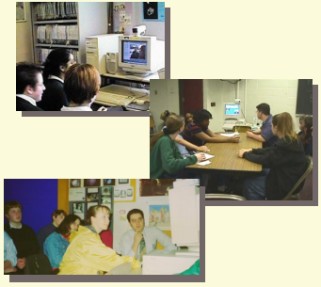
 |
 |
|
Although the project co-ordinators acted as sources for ideas, most of the classroom activities were planned and developed by the teachers themselves. The debate project was an exception to that rule, in that the co-ordinators structured the activity and invited teachers and students to participate. |
|
| The invitation was
taken up by the four schools with the smallest groups of students involved in
the project, and two debates were duly organised. In order to even out differences in age, experience, and levels of debating skill between students from different schools, the 'pro' and 'con' teams were both made up of students from both participating schools. (This also compensated for the differences in the size of the groups from Elgin and Benbecula.) The students had separate videoconferencing discussions to plan their strategy, and used Web BBS facilities to develop their plans and ideas in a common 'virtual discussion area'. |

Work in progress at Coombe Girls' School (top picture), Elgin High (middle picture), and Sgoil Lionacleit |
The debates themselves, of course, took place by videoconference. Videoconference bridges were arranged to allow observers to join in a multi-point link up. Students from Coombe Girls' School (New Malden, London) and the San Francisco School of the Arts debated the topic 'Should cameras be allowed in courtrooms? ', and Elgin High School (Illinois) and Sgoil Lionacleit (Benbecula) covered the arguments for and against 'Is cloning hazardous to human values?' Elgin High and Sgoil Lionacleit used this topic as a lead-in to other science-based work. |
|
 Produced by Melchior Telematics for BT
Community Partnerships © 1998-9
Produced by Melchior Telematics for BT
Community Partnerships © 1998-9